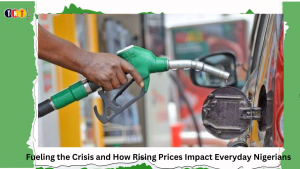
The sharp rise in fuel prices is Fueling the Crisis and How Rising Prices Impact Everyday Nigerians is becoming increasingly clear. As fuel costs soar, the effects ripple through every part of daily life, from skyrocketing transportation fares to higher prices for essential goods and services.
For millions of Nigerians, this surge has created an economic strain, forcing families, small businesses, and entire communities to struggle under the weight of these rising expenses. Understanding how this crisis impacts everyday Nigerians is key to addressing the growing economic and social challenges.
The rapid increase in fuel prices is severely impacting Nigeria’s economy, affecting millions of citizens. As fuel is essential for transportation and energy, the rise in prices is felt by everyone, from commuters to business owners.
Everyday Struggles
For ordinary Nigerians, commuting costs have surged, leading to higher expenses just to get to work. This increase in transportation costs also drives up the prices of goods and services, as businesses pass on their rising costs to customers. Low-income families, already struggling with inflation and stagnant wages, are feeling the pressure the most. Basic needs like food, healthcare, and education are becoming harder to afford.
Small Businesses and the Informal Sector
Small businesses, which make up a large part of Nigeria’s economy, are suffering due to the fuel hike. Many rely on fuel-powered generators because of frequent power outages. With fuel prices rising, their operating costs have soared, forcing some to reduce staff or close down entirely. The informal economy—street vendors, artisans, and transport operators—has been hit hard as well. Their profits are shrinking while customers are increasingly unable to afford their services.
Agriculture and Food Prices
Farmers who depend on fuel for transporting crops to markets are also struggling. Higher transport costs mean higher food prices, adding to the already increasing problem of food insecurity. Perishable goods like fruits, vegetables, and dairy are most affected, as delays in transportation cause losses for farmers and higher prices for consumers.
Public Reaction and Government Response
Public frustration is growing. Many are questioning the government’s decision to remove fuel subsidies, which has led to these price hikes. Protests and strikes are becoming more common as Nigerians demand relief. While the government argues that subsidy removal is essential for economic stability, the immediate impact on ordinary citizens is devastating.
The Way Forward
The fuel crisis calls for urgent action. The government needs to introduce policies that can protect the most vulnerable citizens. Potential solutions include:
- Affordable public transportation: Investing in reliable, low-cost transportation could ease commuting costs.
- Alternative energy sources: Promoting renewable energy, like solar power, can help reduce reliance on expensive fuel.
- Social support: Providing direct financial aid and job creation programs can offer relief to struggling households.
- Agricultural assistance: Helping farmers access affordable transport will reduce food prices and prevent wastage.
Without quick and effective intervention, the fuel price crisis could worsen inequality, increase hardship, and slow down Nigeria’s progress. The government must find a balance between needed reforms and protecting the people most affected by this crisis.



